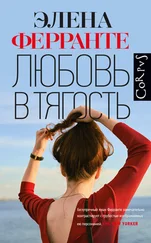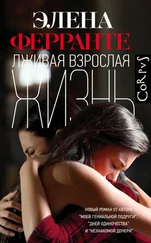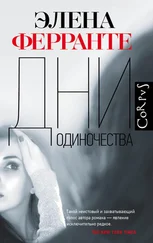I told my mother I was going on a trip to Caserta with my classmates. I put on makeup, I wore the shortest skirt I had, I chose a tight, low-cut shirt, I stuck the bracelet in my purse in case I found myself in a situation where I was forced to give it back, and I hurried downstairs at nine in the morning, the time I had agreed on with Corrado. To my surprise I found waiting for me a yellow car of I don’t know what make—my father had no interest in cars and so I was completely ignorant—but to me it seemed so grand that I was sorry not to be more in touch with Angela and Ida, it would have been satisfying to boast about it. At the wheel was Rosario, in the back seat Corrado, and both were exposed to the air and the sun, because the car had no roof—it was a convertible.
When Corrado saw me come out the front door, he waved with exaggerated joviality, but when I started to get in next to Rosario he said assertively:
“No, sweetheart, you sit next to me.”
I was disappointed, I wanted to show off on the seat beside the driver, who was wearing a blue jacket with gold buttons, a blue shirt, and a red tie, and had combed his hair back, which gave him the profile of a strong, dangerous man—plus he had fangs. I insisted with a conciliatory smile:
“I’ll sit here, thanks.”
But Corrado said, in an unexpectedly mean voice:
“Giannì, are you deaf, I told you come here this second.”
I wasn’t used to that tone, it intimidated me, but I still felt like replying:
“I’m keeping Rosario company, he’s not your chauffeur.”
“What does a chauffeur have to do with it, you belong to me, you have to sit where I am.”
“I don’t belong to anyone, Corrà, and anyway it’s Rosario’s car and I’ll sit where he says.”
Rosario said nothing, he simply turned to me with his laughing boy’s face, stared at my breasts for a long second, and ran the knuckles of his right hand over the seat next to him. I got in and sat down, closed the door, and he set off with a calculated screeching of the tires. Oh, I had done it, hair in the wind, beautiful Sunday sun in my face, I relaxed. And Rosario was such a good driver, he darted here and there, with the confidence of a racecar champion, and I wasn’t afraid.
“Is the car yours?”
“Yes.”
“Are you rich?”
“Yes.”
“Afterward can we go to the Parco della Rimembranza?”
“We can go wherever you want.”
Corrado cut in right away, reaching one hand out onto my shoulder and squeezing it:
“But you’ll do what I tell you to do.”
Rosario looked in the rearview mirror.
“Currà, cool it, Giannina does what she likes.”
“You cool it, I brought her.”
“So what?” I interjected pushing away his hand.
“Shut up, this is a conversation between me and Rosario.”
I said that I would speak how and when I liked, and the whole way I devoted myself to Rosario. I realized that he was proud of his car, and I told him that he drove much better than my father. I goaded him to brag, I took an interest in everything he knew about engines, I went so far as to ask him if in some near future he would teach me to drive the way he did. Finally, taking advantage of the fact that he had his hand on the knob of the gear shift, I placed mine on his, saying: so I’ll help you shift, and on to laughter, I was laughing because I had the giggles, he was laughing because of the shape of his mouth. He was excited by the contact with my hand, I realized. How is it possible, I said to myself, that boys are so stupid, how is it possible that those two, if I merely touch them, if I simply let them touch me, go blind, they don’t see and don’t feel the disgust I feel for myself. Corrado was upset because I wasn’t sitting next to him, Rosario was happy because I was next to him with my hand on his. With a little shrewdness could one make them submit to anything? Were bare thighs, an exposed breast sufficient? Was it enough merely to touch them? Had my mother taken my father like this, as a girl? Had Costanza taken him away from her like this? Had Vittoria also done this with Enzo, taking him away from Margherita? When Corrado, unhappy, touched my neck with his fingers and then caressed the edge of the material beyond which rose the curve of my breast, I let him do it. At the same time I squeezed Rosario’s hand hard for a few seconds. I’m not even pretty, I thought, in amazement, while amid caresses, giggles, allusive if not obscene words, wind and cloud-streaked sky, the car flew, along with the time, and the walls of tufa topped with barbed wire, the abandoned warehouses, the low pale-blue buildings at the end of Via Pascone came into view.
As soon as I recognized them I felt sick to my stomach, the impression of power vanished: now I had to reckon with my aunt. Corrado, reasserting, mainly to himself, that it was he who commanded me, said:
“We’ll leave you here.”
“O.K.”
“We’ll go to the square, don’t make us wait. And remember you got here by public transit.”
“How?”
“Bus, funicular, metro. What you must never say is that we brought you.”
“O.K.”
“Listen, be quick about it.”
I nodded, got out of the car.
12.
I walked for a short stretch with my heart racing. I reached Vittoria’s house, rang the bell, and she opened the door. At first I didn’t understand. I had prepared a short speech to deliver firmly, centered on the feelings that had collected around the bracelet and made it absolutely mine. As soon as she saw me, she hit me with a long, aggressive, sorrowful, maudlin monologue that disoriented and intimidated me. The more she talked, the more clearly I realized that giving back the bracelet was nothing more than an excuse. Vittoria was fond of me, she thought I loved her, too, and above all she wanted to chastise me for having disappointed her.
I hoped—she said in a loud voice, in a dialect that I struggled to understand in spite of my recent efforts to learn it—that you were now on my side, that seeing what sort of people your father and mother really are would allow you to understand who I am, what sort of life I’ve had because of my brother. But no, I waited in vain for you every Sunday. A phone call would have been enough, but no, you didn’t understand, you thought it’s my fault if your family turned out to be shit, and in the end what do you do, look at this, you write me this letter—this letter, to me—to underscore the fact that I didn’t go to school, to underscore the fact that you can write and I can’t. Oh, you really are like your father, no, worse, you don’t respect me, you can’t see what sort of person I am, you don’t have feelings. So give me back the bracelet, it was my dearly beloved mother’s and you don’t deserve it. I was wrong, you don’t have my blood, you’re a stranger.
So I gathered that if in that endless family quarrel I had chosen the right side, if I had treated her as the only support remaining to me, my only guide for life, if I had welcomed the parish church, Margherita, her children as a sort of permanent Sunday refuge, giving back the piece of jewelry would have been unnecessary. While she was yelling, her eyes were fierce and yet sorrowful, I saw white saliva in her mouth that from time to time stained her lips. Vittoria simply wanted me to admit that I loved her, that I was grateful to her for showing me how mediocre my father was, and so I would love her forever, that out of gratitude I would be her support in old age, and other such things. And I, on the spot, decided to tell her just that. In a brief series of statements I went so far as to pretend that my parents had kept me from calling her, then I added that the letter told the truth: the bracelet was a very dear memory of how she had helped me, saved me, put me on the right path. I said it like that, in an emotional voice, and I was amazed at how good I was at speaking to her in a falsely heartfelt way, at how carefully and effectively I chose words, at how I wasn’t like her, but worse.
Читать дальше
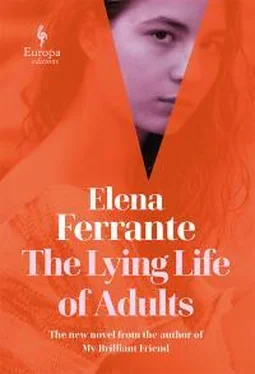
![Элена Ферранте - История о пропавшем ребенке [litres]](/books/32091/elena-ferrante-istoriya-o-propavshem-rebenke-litres-thumb.webp)
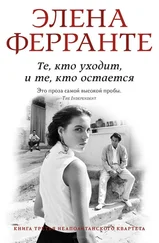
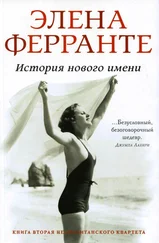
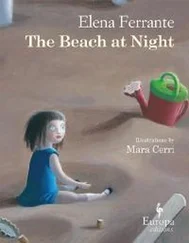
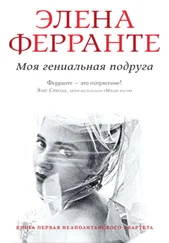
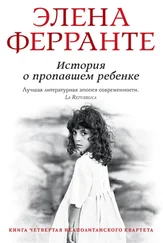
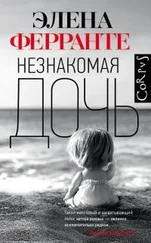
![Элена Ферранте - Дни одиночества [litres]](/books/404671/elena-ferrante-dni-odinochestva-litres-thumb.webp)
